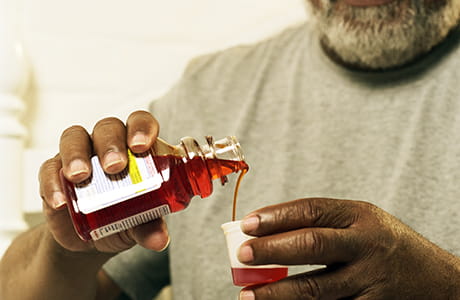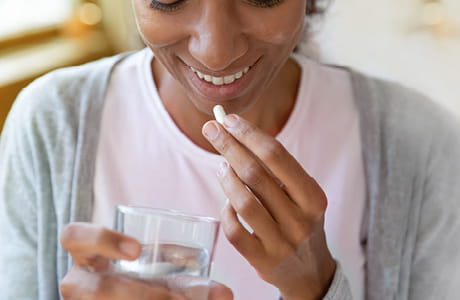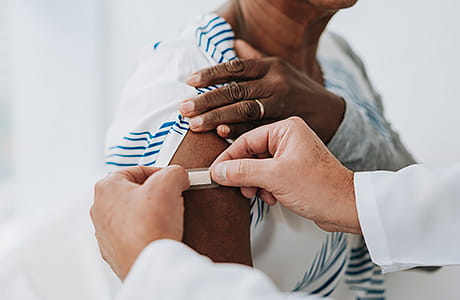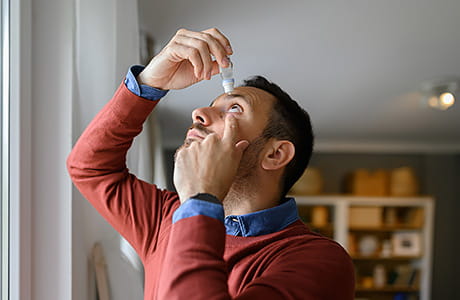Taking cold medicine with high blood pressure
Knowing what’s in the ingredient list matters.
Feeling that congestion and head pressure? Sniffling and sneezing? Having a cold can send you running to the medicine cabinet. But before you do, it’s helpful to understand how some cold medicine can affect your blood pressure — in case you need to find an alternative.
What is high blood pressure?
As your heart pumps blood to the rest of your body, the blood hits the walls of your arteries. “That level of force is how we measure blood pressure,” says Micaela Mitchell, pharmacy manager at Geisinger Medical Center. A normal blood pressure reading falls somewhere between 90/60 and 120/80. High blood pressure, also called hypertension, means that your blood pressure is greater than the normal range.
Lots of things can raise blood pressure, including:
- Stress
- Being overweight
- Smoking
- Age
- Eating a lot of salt
- Certain medications, especially cold medicine
How does cold medicine affect blood pressure?
Most over-the-counter cold medicine contains ingredients that relieve congestion, or decongestants. They come in a few forms like liquid, nasal spray or capsules. Common types of decongestants include:
- Pseudoephedrine
- Phenylephrine
“Decongestants work by shrinking swollen blood vessels,” Mitchell says. Those narrowed blood vessels reduce swelling in your nose, helping you breathe better.
Reducing the congestion gives you some relief from your symptoms. But it’s harder for blood to flow properly through these narrowed blood vessels. Because blood can’t flow as freely, your heart has to work harder to pump blood through your body. This can cause blood pressure to increase.
If you already have high blood pressure, check the label before taking any cold medicine. Those that contain decongestants may have a warning label on the bottle.
What to take instead
Looking for an alternative to decongestants? Start by having a conversation with your pharmacist. They can recommend safer alternatives like:
Nasal spray
Use saline nasal spray to reduce swelling and relieve congestion. Your pharmacist or healthcare provider can help you find the right nasal spray for you.
Antihistamines
Another way to relieve cold symptoms: taking an antihistamine. Though typically used for allergies, antihistamines help clear congestion. And they can also offer relief from other cold symptoms like sneezing, runny nose or a sore throat.
Blood-pressure-safe medicine
“People with high blood pressure can also look for cold medicines that don’t contain decongestants,” says Mitchell. “These will say on the label that they’re safe to take with high blood pressure.”
Not sure what you’re looking for? Seek out a medicine that says “HBP” on the label.
And if you’d rather not take medications, there are plenty of natural ways to get relief.
Treating your symptoms
To start feeling better, try these easy natural remedies. The best part? They won’t raise your blood pressure. And you can do them on your own schedule.
Hydrate
Staying hydrated helps to thin mucus, reducing congestion. “Proper hydration also keeps your immune system working at its best, so you feel better faster,” adds Mitchell.
Drinking water is a good place to start. You can avoid getting too depleted by sipping electrolyte drinks, broth or juice. Hot tea can also help soothe a sore throat.
Rest
The biggest key to feeling better when you’re ill is getting some much-needed R & R. Resting helps your body reset its immune system. So sleep when possible, avoid exercise and take it easy for a few days to start feeling more like you again.
Flush your nasal passages
Flushing your nose, also called nasal irrigation, can help you breathe easier. This process helps clear congestion and thin mucus. To get started, fill your bottle or neti pot with warm, salty, purified water. Tilt your head to one side over the sink and gently pour the water through your top nostril. The water should flow through the nostril closest to the sink. Repeat the process on the other side.
Try some honey
Eating honey, especially raw local honey, can help soothe a sore throat. It can also reduce coughing. An added bonus: Eating raw local honey can help boost your immune system. But never give honey to children under 1 year old.
Take a shower
When you’re sick, few things offer relief like a hot shower. Besides washing your body, a hot shower packs a punch to lessen your cold symptoms. A shower can help:
- Clear a blocked nose
- Warm you up
- Loosen congestion
- Open blood vessels and relax muscles to relieve aches and pains
- Deliver relaxation
Need more relief? Talk to your provider
If your symptoms haven’t started to go away after seven to 10 days, contact your healthcare provider. They can help determine if it’s a cold or something more serious. And they’ll help you find the right treatment so you can feel your best.
Next steps:
Get to know Geisinger Pharmacy
Bouncing back after a bug
Which cold or flu remedies work?





